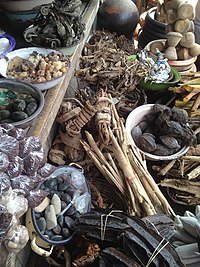
Photo from wikipedia
Wound healing is a complicated process that contains a number of overlapping and consecutive phases, disruption in each of which can cause chronic nonhealing wounds. In the current study, we… Click to show full abstract
Wound healing is a complicated process that contains a number of overlapping and consecutive phases, disruption in each of which can cause chronic nonhealing wounds. In the current study, we investigated the effects of exosomes as paracrine factors released from menstrual blood‐derived mesenchymal stem cells (MenSCs) on wound‐healing process in diabetic mice. The exosomes were isolated from MenSCs conditioned media using ultracentrifugation and were characterized by scanning electron microscope and western blotting assay. A full thickness excisional wound was created on the dorsal skin of each streptozotocin‐induced diabetic mouse. The mice were divided into three groups as follows: phosphate buffered saline, exosomes, and MenSC groups. We found that MenSC‐derived exosomes can resolve inflammation via induced M1–M2 macrophage polarization. It was observed that exosomes enhance neoangiogenesis through vascular endothelial growth factor A upregulation. Re‐epithelialization accelerated in the exosome‐treated mice, most likely through NF‐κB p65 subunit upregulation and activation of the NF‐κB signaling pathway. The results demonstrated that exosomes possibly cause less scar formation through decreased Col1:Col3 ratio. These notable results showed that the MenSC‐derived exosomes effectively ameliorated cutaneous nonhealing wounds. We suggest that exosomes can be employed in regenerative medicine for skin repair in difficult‐to‐heal conditions such as diabetic foot ulcer.
Journal Title: Journal of Tissue Engineering and Regenerative Medicine
Year Published: 2019
Link to full text (if available)
Share on Social Media: Sign Up to like & get
recommendations!